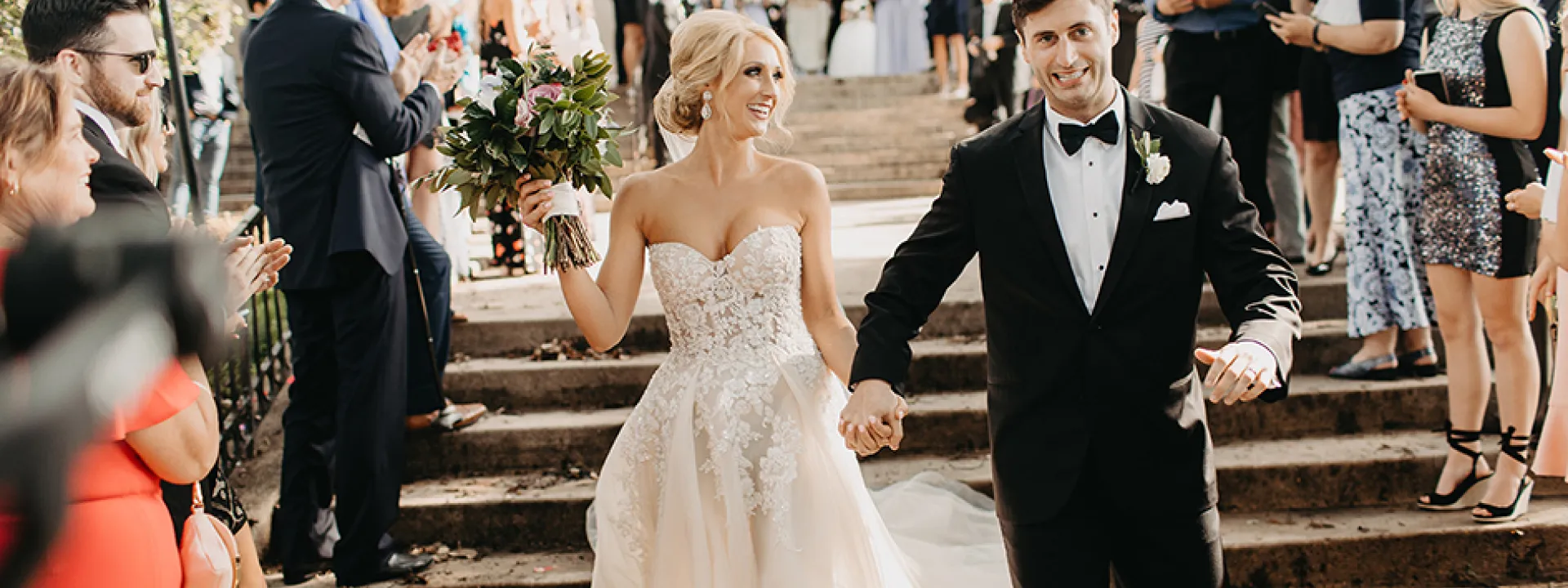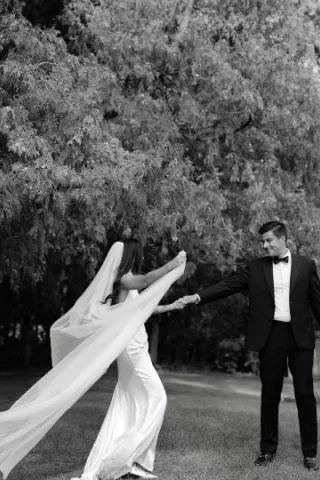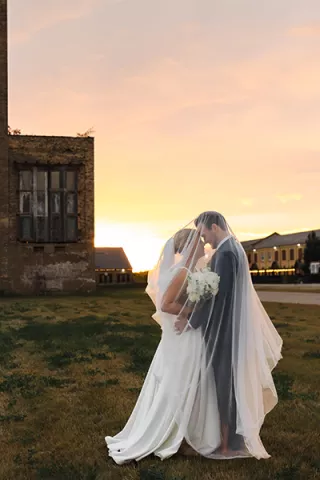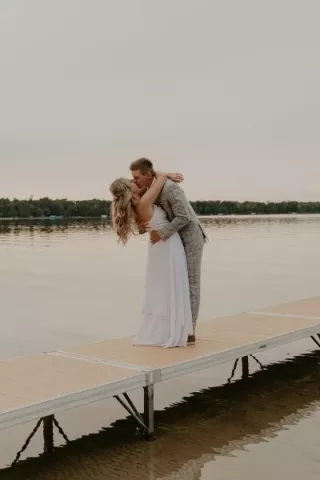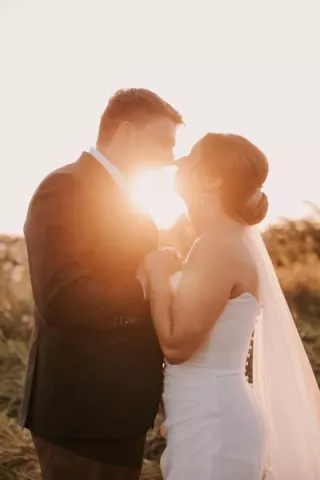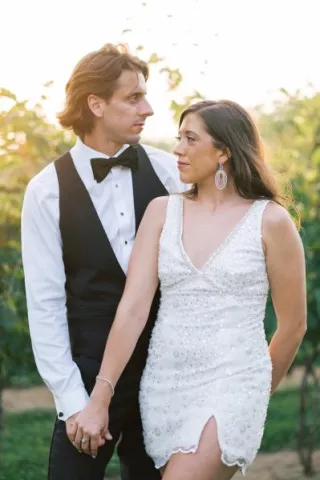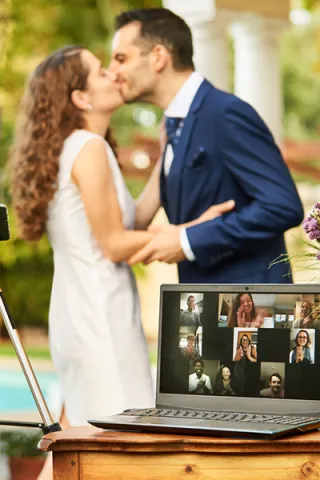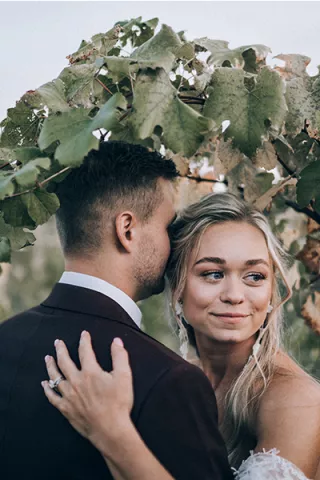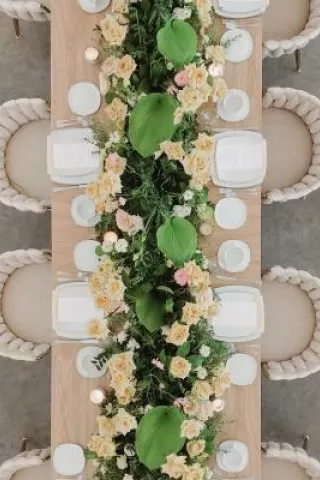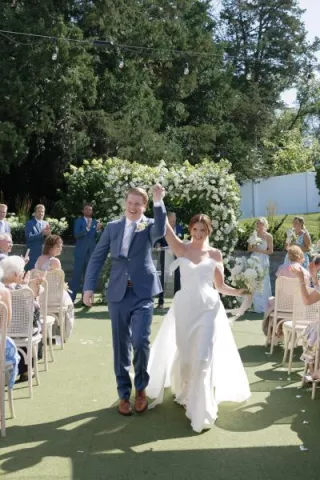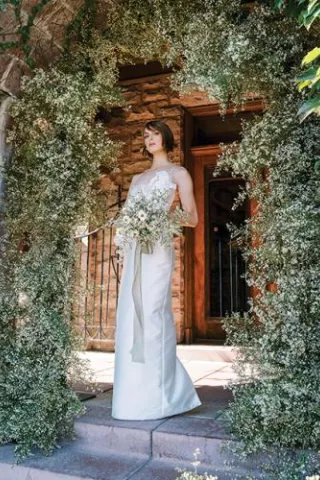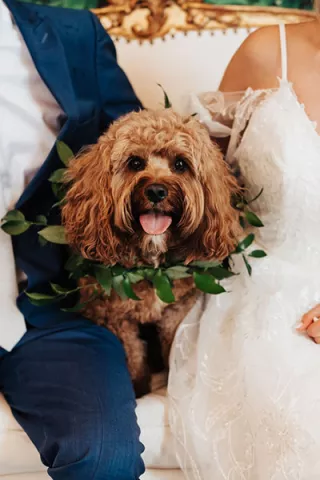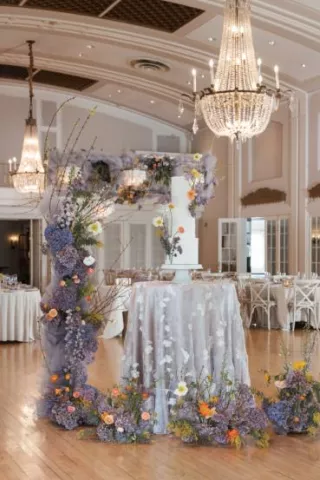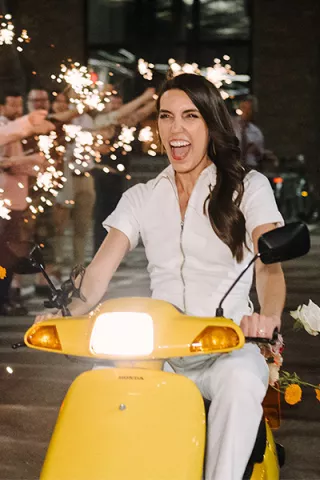Q: We’re planning a church ceremony. Do you have any recommendations on how we keep that part of our day personal and unique to us, especially if our wedding ceremony will include a full mass?
A: Getting married in a church is a wonderful way to honor tradition and include your faith in your wedding ceremony. While much of a church wedding ceremony is predetermined, adding personal touches throughout will ensure your ceremony feels authentic to you and your fiancé.
Lindsay Kunz and Kimberly Seymour, co-owners and lead planners of Pink Peony Weddings & Events, have helped dozens of couples plan their church wedding ceremonies; roughly a third of all weddings they helped coordinate last year featured church ceremonies.
“We know that one of the most challenging aspects of a church ceremony is adhering to the different rules and regulations that the church may have in place,” they say. But don’t fret. “Even with these regulations, there are still many ways couples can stay true to their vision and personalize their wedding ceremony.”
Before getting started, check with your church to get a full outline of their ceremony practices and guidelines. “Every church is different, and each will have different rules for photography, outside vendors, music selections and readings,” say Kunz and Seymour. “Knowing what guidelines you’re able to work within is the best place to start.”
Once you’re familiar with what your church allows, the next step is to brainstorm. Kunz and Seymour suggest you consider the following ideas to personalize your wedding ceremony:
•Pick approved readings that resonate with you and your fiancé. Better yet, have family or friends read them during the ceremony.
•Make your music personal. Select songs you both enjoy, and if you have any talented friends or family, invite them to perform as your musicians during the service.
•If allowed, customize your wedding programs. Ensure they have the same look and feel as your wedding reception décor and highlight important people who are involved in your wedding (your bridal party, your families, and other friends or family involved in the ceremony).
•Decorate the church. Add flowers on the end of each pew that match your bouquets, place specific signage around the church (including welcome and reserved signs), and give custom signs to your ring bearers and flower girls (the cuter, the better!)
•Have a “Just Married” sendoff once you leave the church. Have your guests toss flower petals or sprinkles, blow bubbles or wave streamers. You’ll love your send-off photos and your guests will remember the scene for years.
Q :Our wedding venue has a venue coordinator—do we also need an event planner? What’s the difference?
A: There’s a big difference between an event planner and a venue coordinator. And depending on the level of assistance you’d like in planning and executing your big day, you might need a planner in addition to that venue coordinator.
Rachelle Mazumdar, owner and director of Style-Architects Weddings + Events, has helped dozens of couples navigate the wedding-planning waters. “The main difference between an event planner and venue coordinator is that the venue coordinator works for the venue, while the event planner works directly for you.”
Typically, most venues provide a coordinator to act as a liaison between you and the venue staff. The coordinator’s primary responsibility is to ensure your experience with the venue itself goes smoothly. (Because of this, many places do not charge an extra fee for the coordinator.)
“Venue coordinators generally step in one month prior to the wedding to help with space planning and make sure the space is set up and functioning properly for the event. They turn on lights and place tables,” Mazumdar says. “It’s common that the venue coordinator you work with is not actually there on the day of the wedding. Often, they hand off the day-of duties to an event captain, who could be someone you may not have worked with throughout the planning process.”
An event planner, on the other hand, is involved in the planning process from the start. “Event planners work with you to ensure you get the wedding of your dreams, with minimal stress,” says Mazumdar. She notes that event planners can provide advice on budgeting, vision and selecting a vendor, manage the planning and vendors, and advise on every detail from hotel blocks to invitation wording to transportation booking—and everything in between. “Then, day of, event planners do everything from keeping emergency wardobe-repair kits on hand in case of rips or stains to ensuring every vendor delivers an amazing experience for you and your guests.”
Most event planners offer a range of services, so you and your fiancé can decide if you’d like to be highly involved in planning your wedding from the start or prefer more guidance as you get closer to your big day. This ensures that your planning needs are met while adhering to your overall budget.
Every couple’s needs are different, but to fully enjoy your big day stress-free, consider hiring a planner, even if your venue provides a coordinator. Think about it this way, says Mazumdar: Event planners are working 12 to 16 hours on your wedding day, tending to the couple, vendors and guests while setting up and managing the event. “Without a wedding planner executing these activities, who is?”
Q: My fiancé and I are starting to look at our calendars, trying to decide how much time we should take off from work before our wedding. What’s standard for maintaining our pre-wedding sanity?
A: It’s your wedding! In our opinion, the more time you can take off work, the better. This will help you feel calm and fully prepared for your big day.
“Your wedding isn’t just one day,” says Josey Stafford, founder and head planner of Sixpence Events. “There’s the day before, where you have your rehearsal and rehearsal dinner. Then there’s the day after, where you might have a gift opening and brunch. But there’s also the week leading up to your wedding, which will be filled with extreme excitement, anticipation and likely last-minute to-dos,” she says.
Stafford recommends couples take at least two or three days off before their wedding. “Vacation time is the best time. If you have a flexible or gracious employer, I suggest taking off the entire week,” she says. “Especially if you are forgoing an event planner or if you have more than a few DIY projects to finish, you’ll want plenty of rest and lots of time to complete tasks like your place cards, bridal-party gifts and finishing your vows.”
While it can be daunting looking at the total number of days off for your wedding, especially if you’re going on a honeymoon afterward, remember that this is a special celebration that you and your fiancé have been preparing and waiting for. You won’t want to look back on this time and remember feeling stressed and unprepared, wishing you’d taken more time off work. Feel confident with your decision and know that taking time off is normal—enjoy it!
Q: What are the typical dress codes for weddings, and how do we indicate our dress code to our guests? Help!
A: This is a question nearly every couple deals with. The best part? Wedding guests appreciate knowing the dress code.
First things first: Determine what you want your dress code to be, but don’t worry if you don’t have anything specific in mind. “The weddings in our region don’t typically need to indicate a dress code for their guests, unless they specifically want to encourage their guests to be more formal or adhere to a unique dress code,” says Mariah McKechnie, owner and principal event specialist of Northland Special Events. Curious what your options are?
•Semi-formal: Most people adhere to a semi-formal dress code (which doesn’t need to be specifically stated on your invitations). A semi-formal dress code typically means that men should wear a suit, while women should wear a nice dress, a fancy skirt and top or pantsuit.
•Black tie optional: This is a step up from semi-formal. Men should wear a tuxedo or a formal suit and dark tie, while women should wear a long evening dress or a formal cocktail dress.
•Black tie: This is the most formal wedding dress code. Men are encouraged to wear a tuxedo with a bow tie, while women should wear a formal evening gown.
•If none of these dress codes fit the bill for your wedding, that’s OK. Especially if you’re hosting your wedding at a unique venue or somewhere out of state, your guests will likely be looking for guidance on what to wear. This is a great time to encourage a theme-oriented dress code. “I love it when couples have fun with dress code suggestions—‘Wear your best plaid’ for a northwoods wedding, or ‘Come dressed to dance in glitter and glam’ for a New Year’s Eve wedding,” McKechnie says.
Your wedding invitations and wedding website are the perfect places to let your guests know the attire you’d like them to wear. The language needs to be included in the invitation suite, says McKechnie. It’s OK to repeat or elaborate on dress code information on your website, even though you’ve already mentioned it in the invitations.
Last but not least, don’t forget about footwear. If the wedding is outdoors and guests will be walking on grass, rocks or sand, the couple should remind guests about appropriate footwear, says McKechnie. “Again, this would be perfect information to include on a website and an accompanying card in an invitation suite. They could say something like, ‘Please note that the ceremony and reception will be outside on grass. For your comfort, heels are not recommended.’ ”
Your wedding worries, solved.
Written by
Courtney Reigh
Published:
Spring/Summer 2019
Season:
spring
summer
